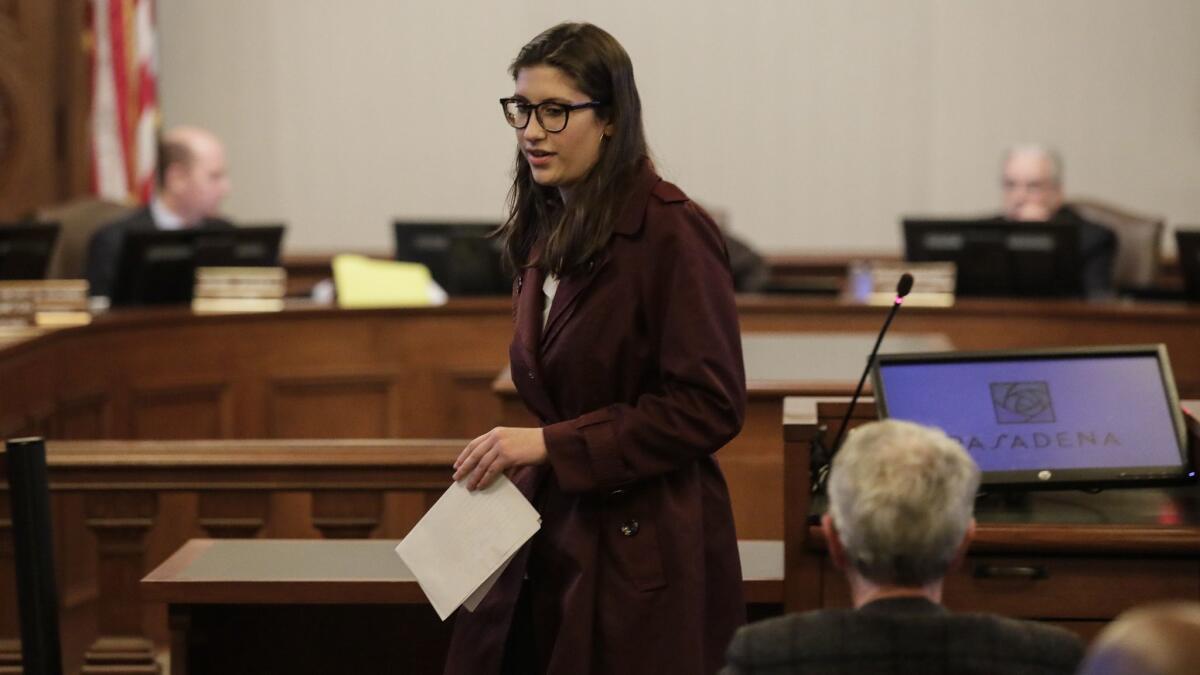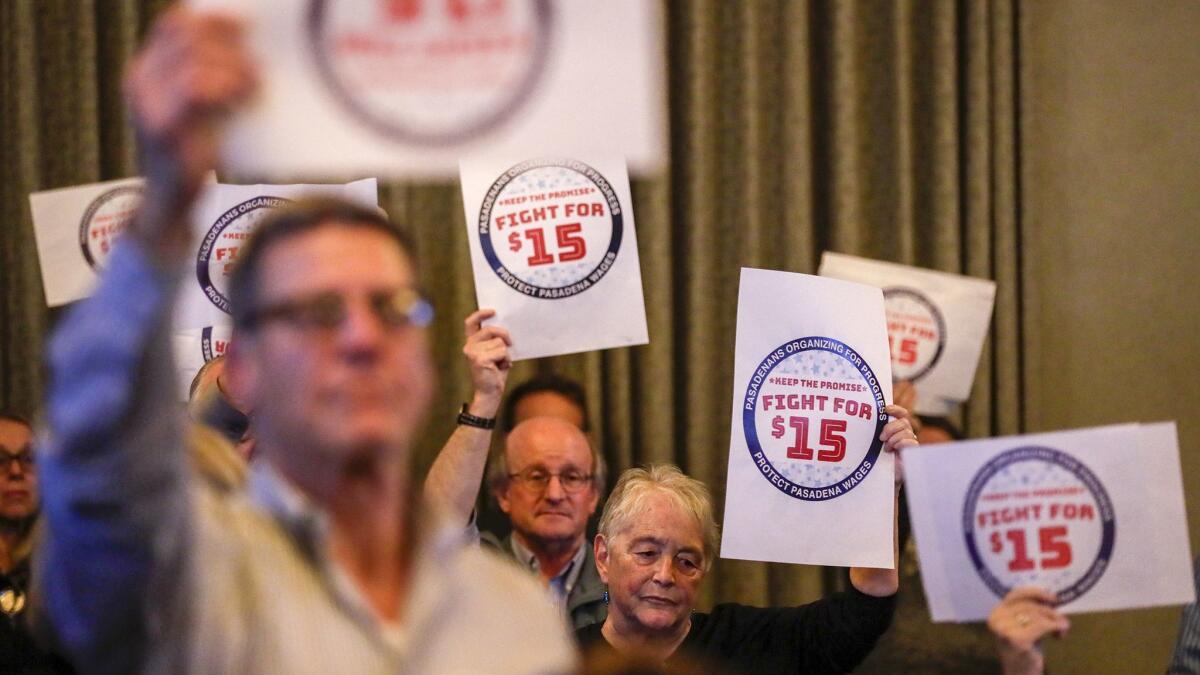Column: In Pasadena, the fight for a higher minimum wage got an assist from the Rose Queen

The Pasadena Rose Queen had a big high school physics project due Tuesday morning, so she hoped to get out of Monday night’s City Council meeting early.
This did not happen.
The debate about how fast to roll out a minimum wage increase in Pasadena drew an overflow crowd of dueling economists, local business owners and workers, most of whom seemed to have more to say than could fit in the council’s loosely enforced one-minute speaking limit.
Queen Louise Deser Siskel sat in the rear of the room, keeping one eye on the proceedings and the other on her laptop, as she worked on her paper about what could be done to save our hides if a giant asteroid were about to collide with Earth.
Finally, nearly three hours into the meeting, Siskel’s name was called, and heads turned.
“I wonder if she’s on our side,” said a woman who held a sign calling for a $15 hourly minimum wage.
In the long and proud history of the Tournament of Roses, political activism was not generally something expected of the queen. But Siskel, the 101st young woman to wear the crown, has begun the royal court’s second century on a different path. As she noted in an op-ed piece for The Times, she is Jewish, she wears glasses, she is bisexual, and she wants to speak up for diversity, inclusion and scientific literacy.
“While Pasadena is an extraordinarily prosperous city,” Siskel told the City Council, “it also has the highest income inequality ratio of any major city.” She added: “Ensuring that anyone in our city can earn a living wage is truly an issue of equity.”
The issue before the City Council was not whether to raise the minimum wage, but how fast. Pasadena, Los Angeles and Santa Monica all put themselves on a fast track to gradually raise their minimum hourly wage to $15 by mid-2020, even though the state won’t hit that mark until 18 months later.
In Pasadena, the question was whether to stick with the schedule and bump pay from the current $13.25 to $14.25 an hour this July for companies with more than 25 employees.
The city commissioned two studies on the impact of staying the course, and unsurprisingly, two economists arrived at different conclusions.

UCLA’s Ed Leamer concluded the city could lose jobs if employers are forced to pay $15 an hour 18 months before the state requires that pay scale.
UC Berkeley’s Michael Reich forecast no such downside.
There were no fisticuffs, but the two economists, both of whom testified Monday, did share verbal jabs.
I’m not an economist, but it seems to me that when we debate the pros and cons of raising the minimum wage, we’re missing the bigger picture. For all the talk of boom times, the economy is broken for those not at the top of the heap, and figuring out how much and how quickly to raise the minimum wage a buck or two doesn’t address the bigger concern — namely, will we ever see a return of middle-income wages?
I’m reminded of the Boeing employees in Long Beach who had $40-an-hour jobs until the assembly line shut down in 2015, then discovered it was nearly impossible to find anything that paid $15 an hour or more.
It’s hard to live on that in California. But until a new economy is invented, there aren’t a lot of options beyond raising the minimum wage.
Employers, however, do not appreciate being told how much they have to pay, or can afford to pay, and many of them are struggling, too. The owners of several popular restaurants stepped to the podium Monday night to ask the council to slow the rate of future pay bumps.
Armen Shirvanian of Mi Piace said a plate of pasta that cost $15 in 2015 is now up to $18.70 at his Colorado Boulevard restaurant, and his staff has been trimmed from 88 to 72 in that time, something he blames on the rising minimum wage.
“With each increase we’ve had to cut hours, we’ve eliminated positions and we’ve raised prices,” said Bob Harris, owner of Green Street Restaurant. “Even though our staff members are making more per hour, they’re working fewer hours.”
R-Lene Mijares de Lang, owner of two popular restaurants, spoke of her family’s 99-year-old business and its new challenges. She said 16 Mijares employees have been let go, and one of the two restaurants might be shuttered for good.
But while the owners had their take on the impact of wage increases, so did those who said that when you’re on the bottom rung, it’s hard to hang on.
“A $1.75 increase may look like a drop in the bucket,” said Cameron Hughes, a restaurant employee, referencing the proposed increase by 2020. “However to those of us in the working class, an increase even in the smallest increment represents...more food on my table and the ability to better afford my rent and possibly more. It’s my work and the work of others in this city that generates the profits for businesses. We keep this city running. We want to live and work and spend our money here.”
Queen Louise, by the way, had told me earlier in the day that as part of her royal duties, she met with and spoke to more than 100 local organizations, many of which are devoted to serving those in need. She said she did her homework on the minimum wage, reading the reports presented by the two economists.
She noted that neither report found evidence of significant job losses after the last wage hike to $13.25, and she pointed out that Pasadena was in line with Los Angeles rather than acting unilaterally.
Siskel was already home, touching up her proposal on how to zap an incoming asteroid, when the City Council finally voted Monday night.
The outcome was in doubt until the last minute of a long evening, and supporters of the quicker wage increase were hoping, wishing, praying they might squeeze out a slim, one-vote victory in a city where business interests have historically held sway.
Maybe the queen’s bold break with tradition was contagious.
By a 7-to-1 vote, the City Council sided with the queen’s royal subjects, and Pasadena will take the fast track to $15 an hour.
Get more of Steve Lopez’s work and follow him on Twitter @LATstevelopez
More to Read
Start your day right
Sign up for Essential California for news, features and recommendations from the L.A. Times and beyond in your inbox six days a week.
You may occasionally receive promotional content from the Los Angeles Times.







